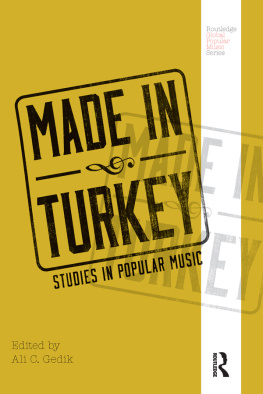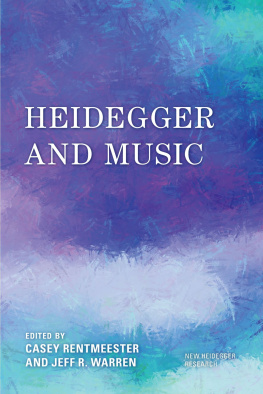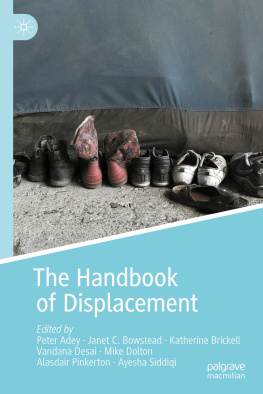Europea: Ethnomusicologies and Modernities
Series Editors: Philip V. Bohlman and Martin Stokes
1. Celtic Modern: Music at the Global Fringe, edited by Martin Stokes and Philip V. Bohlman, 2003.
2. Albanian Urban Lyric Song in the 1930s, by Eno Koo, 2004.
3. The Mediterranean in Music: Critical Perspectives, Common Concerns, Cultural Differences, edited by David Cooper and Kevin Dawe, 2005.
4. On a Rock in the Middle of the Ocean: Songs and Singers in Tory Island, Ireland, by Lillis Laoire, 2005.
5. Transported by Song: Corsican Voices from Oral Tradition to World Stage, by Caroline Bithell, 2007.
6. Balkan Popular Culture and the Ottoman Ecumene: Music, Image, and Regional Political Discourse, edited by Donna A. Buchanan, 2007.
7. Music and Musicians in Crete: Performance and Ethnography in a Mediterranean Island Society, by Kevin Dawe, 2007.
8. The New (Ethno) musicologies, edited by Henry Stobart, 2008.
9. Balkan Refrain: Form and Tradition in European Folk Song, by Dimitrije O. Golemovi, 2010.
10. Music and Displacement: Diasporas, Mobilities, and Dislocations in Europe and Beyond, edited by Erik Levi and Florian Scheding, 2010.
Europea: Ethnomusicologies and Modernities
Series Editors: Philip V. Bohlman and Martin Stokes
The new millennium challenges ethnomusicologists, dedicated to studying the music of the world, to examine anew the Western musics they have treated as traditional, and to forge new approaches to world musics that are often overlooked because of their deceptive familiarity. As the modern discipline of ethnomusicology expanded during the second half of the twentieth century, influenced significantly by ethnographic methods in the social sciences, ethnomusicologys field increasingly shifted to the exoticized Other. The comparative methodologies previously generated by Europeanist scholars to study and privilege Western musics were deliberately discarded. Europe as a cultural area was banished to historical musicology, and European vernacular musics became the spoils left to folk-music and, later, popular-music studies.
Europea challenges ethnomusicology to return to Europe and to encounter its disciplinary past afresh, and the present is a timely moment to do so. European unity nervously but insistently asserts itself through the political and cultural agendas of the European Union, causing Europeans to reflect on a bitterly and violently fragmented past and its ongoing repercussions in the present, and to confront new challenges and opportunities for integration. There is also an intellectual moment to be seized as Europeans reformulate the history of the present, an opportunity to move beyond the fragmentation and atomism the later twentieth century has bequeathed and to enter into broader social, cultural, and political relationships.
Europea is not simply a reflection of and on the current state of research. Rather, the volumes in this series move in new directions and experiment with diverse approaches. The series establishes a forum that can engage scholars, musicians, and other interlocutors in debates and discussions crucial to understanding the present historical juncture. This dialogue, grounded in ethnomusicologys interdisciplinarity, will be animated by reflexive attention to the specific social configurations of knowledge of and scholarship on the musics of Europe. Such knowledge and its circulation as ethnomusicological scholarship are by no means dependent on professional academics, but rather are conditioned, as elsewhere, by complex interactions between universities, museums, amateur organizations, state agencies, and markets. Both the broader view to which ethnomusicology aspires and the critical edge necessary to understanding the present moment are served by broadening the base on which academic discussion proceeds.
Europe will emerge from the volumes as a space for critical dialogue, embracing competing and often antagonistic voices from across the continent, across the Atlantic, across the Mediterranean and the Black Sea, and across a world altered ineluctably by European colonialism and globalization. The diverse subjects and interdisciplinary approaches in individual volumes capture something ofand, in a small way, become part ofthe jangling polyphony through which the New Europe has explosively taken musical shape in public discourse, in expressive culture, and, increasingly, in political form. Europea: Ethnomusicologies and Modernities aims to provide a critical framework necessary to capture something of the turbulent dynamics of music performance, engaging the forces that inform and deform, contest and mediate the senses of identity, selfhood, belonging, and progress that shape European musical experience in Europe and across the world.
Music and Displacement
Diasporas, Mobilities,
and Dislocations
in Europe and Beyond
Edited by
Erik Levi and Florian Scheding
Europea: Ethnomusicologies
and Modernities, No. 10

SCARECROW PRESS, INC.
Published in the United States of America
by Scarecrow Press, Inc.
A wholly owned subsidiary of
The Rowman & Littlefield Publishing Group, Inc.
4501 Forbes Boulevard, Suite 200, Lanham, Maryland 20706
www.scarecrowpress.com
Estover Road
Plymouth PL6 7PY
United Kingdom
Copyright 2010 by Erik Levi and Florian Scheding
All rights reserved. No part of this publication may be reproduced, stored in a retrieval system, or transmitted in any form or by any means, electronic, mechanical, photocopying, recording, or otherwise, without the prior permission of the publisher.
British Library Cataloguing in Publication Information Available
Library of Congress Cataloging-in-Publication Data
Music and displacement: diasporas, mobilities, and dislocations in Europe and beyond / edited by Erik Levi and Florian Scheding.
p. cm. (Europea: ethnomusicologies and modernities, no. 10)
Includes bibliographical references and index.
ISBN 978-0-8108-6379-8 (cloth: alk. paper) ISBN 978-0-8108-7295-0 (pbk.: alk. paper) ISBN 978-0-8108-7410-7 (ebook)
1. MusicHistory and criticism. 2. Emigration and immigrationSongs and musicHistory and criticism. I. Levi, Erik. II. Scheding, Florian, 1976
ML160.M862 2010
780.9dc22 2009047771
 The paper used in this publication meets the minimum requirements of American National Standard for Information SciencesPermanence of Paper for Printed Library Materials, ANSI/NISO Z39.48-1992.
The paper used in this publication meets the minimum requirements of American National Standard for Information SciencesPermanence of Paper for Printed Library Materials, ANSI/NISO Z39.48-1992.
Manufactured in the United States of America.
CONTENTS
Philip V. Bohlman and Martin Stokes
Florian Scheding and Erik Levi
Philip V. Bohlman
Peter Petersen
Michael Beckerman
Jehoash Hirshberg
Ruth F. Davis
Sean Campbell
Bjrn Heile
Florian Scheding
Max Paddison
Sydney Hutchinson
Jim Samson
SERIES EDITORS FOREWORD
PHILIP V. BOHLMAN AND MARTIN STOKES
In the course of the turbulent twentieth century, displacement became one of the defining conditions of European modernity. The collapse of empires, the conflagration of world wars, the ravages of nationalist strife, and the devastation of genocide collectively conspired to transform Europe into a space of displacement. Migrants and minorities, refugees and exiles, Gastarbeiter
Next page








 The paper used in this publication meets the minimum requirements of American National Standard for Information SciencesPermanence of Paper for Printed Library Materials, ANSI/NISO Z39.48-1992.
The paper used in this publication meets the minimum requirements of American National Standard for Information SciencesPermanence of Paper for Printed Library Materials, ANSI/NISO Z39.48-1992.